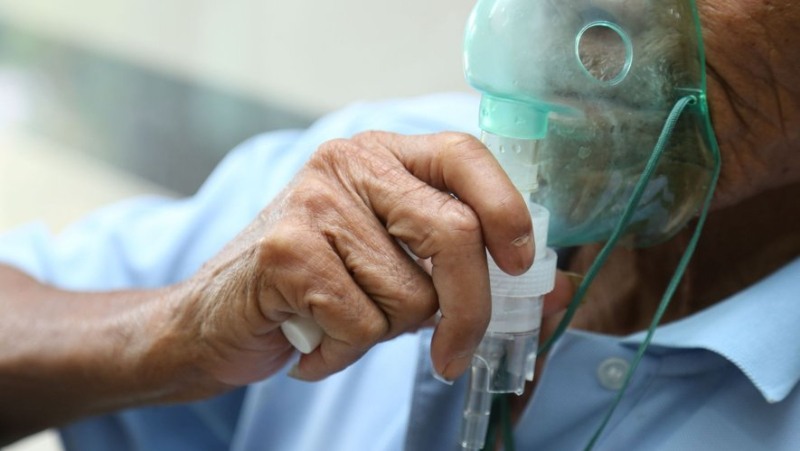Bronchiolitis: seniors who are very vulnerable to respiratory syncytial virus, what are the symptoms ?

Bronchiolite : les séniors très fragiles face au virus respiratoire syncytial (VRS)
We are well aware of bronchiolitis, this respiratory disease which affects thousands of babies every winter.
But people aged over 65 and suffering from comorbidity are also at risk of presenting severe symptoms, such as acute respiratory failure, in the event of respiratory syncytial virus (RSV) infection.
The Minister of Health Catherine Vautrin announced last week the reimbursement "from the fall"respiratory syncytial virus (RSV) for seniors. The green light will be given after the opinion of the High Health Authority (HAS), which should fall in the summer.
La Haute Autorité de Santé rendra son avis "cet été" sur le vaccin GSK contre le virus de la bronchiolite des seniors et "logiquement, à partir de l'automne, on pourra en disposer", affirme la ministre du Travail et de la Santé Catherine Vautrin sur @bleumayenne @CaVautrin pic.twitter.com/aNoiKkCbuP
— France Bleu Mayenne (@bleumayenne) February 22, 2024
RSV, a seasonal respiratory virus, infects cells in the human upper and lower respiratory tract. Very contagious, it is notably the cause of bronchiolitis, this infection common in infants and very young children (under two years).
It’s one of the leading causes of hospitalization of infants under 1 year old. Each year, it is estimated that it affects 30% of babies, or 480,000 cases per year. Severe bronchiolitis, requiring hospitalization, concerns 2 to 3% of cases; infants, the majority of whom do not present any risk factors.
A dangerous virus for the elderly
Bronchiolitis is a well-known disease, especially among young parents. What is less known is that RSV also causes respiratory infections in adults, the symptoms of which can vary from a simple cold to acute respiratory distress. Nasal congestion, rhinorrhea, sore throat confirm, after an incubation of 3 to 5 days, damage to the upper respiratory tract. Most often, these symptoms, similar to those of a common cold, are mild and pass in just a few days.
But in the elderly, lower respiratory tract involvement is common, accompanied by cough, sputum, wheezing and dyspnea. Concerning this fragile population, "several studies have reported radiological signs of pneumonia in 30% to 67% of patients infected with RSV and hospitalized, and progression towards acute respiratory distress in 8 % to 16% of these patients, relays the HAS. Patients with comorbidities – heart disease (heart failure), lung disease (COPD, asthma), immunosuppression (cancer, organ transplant) – are also at risk of complications (hospitalization in intensive care, or even death).
25,000 hospitalizations each year in France
According to an article published in September in Le Parisien, signed by experts calling for a vaccine against RSV for adults at risk, the danger of this virus is "potentially greater than that of the flu". Thus, one death would occur in 5 to 10% of hospitalizations, or one death in 10 to 20 hospitalizations. "In France, it is estimated that there are 20,000 to 25,000 hospitalizations each year in connection with severe RSV infection in subjects over 65 years old, a figure very close to that of hospitalizations linked to influenza", write the signatories of the forum.
It is estimated that RSV is responsible for 3.4 million hospitalizations and 100,000 deaths worldwide each year. In Europe, RSV is responsible for more than 270,000 hospitalizations and 20,000 hospital deaths each year among adults aged 60 and over.
Several vaccines available soon
In the columns of Le Parisiens, doctors pleaded for vaccination of vulnerable people from winter 2023. "To avoid thousands of hospitalizations with an obvious overload on the health system and of course potential deaths, we must maintain the responsiveness shown during the Covid crisis and prioritize prevention", they had justified.
Since September 2023, infants have had a preventive treatment, Beyfortus. For adults, several vaccines are on track, including Arexvy (GSK) which has received marketing authorization from the European Medicines Agency (EMA) and which should therefore be reimbursed in France in the fall. Other pharmaceutical laboratories, Pfizer with Abrysvo and Moderna with an mRNA vaccine candidate are also in the running.
Note: barrier gestures can also limit the risk of infection. Wear a mask if you yourself have a cold, in the presence of people at risk and ventilate the room regularly.




